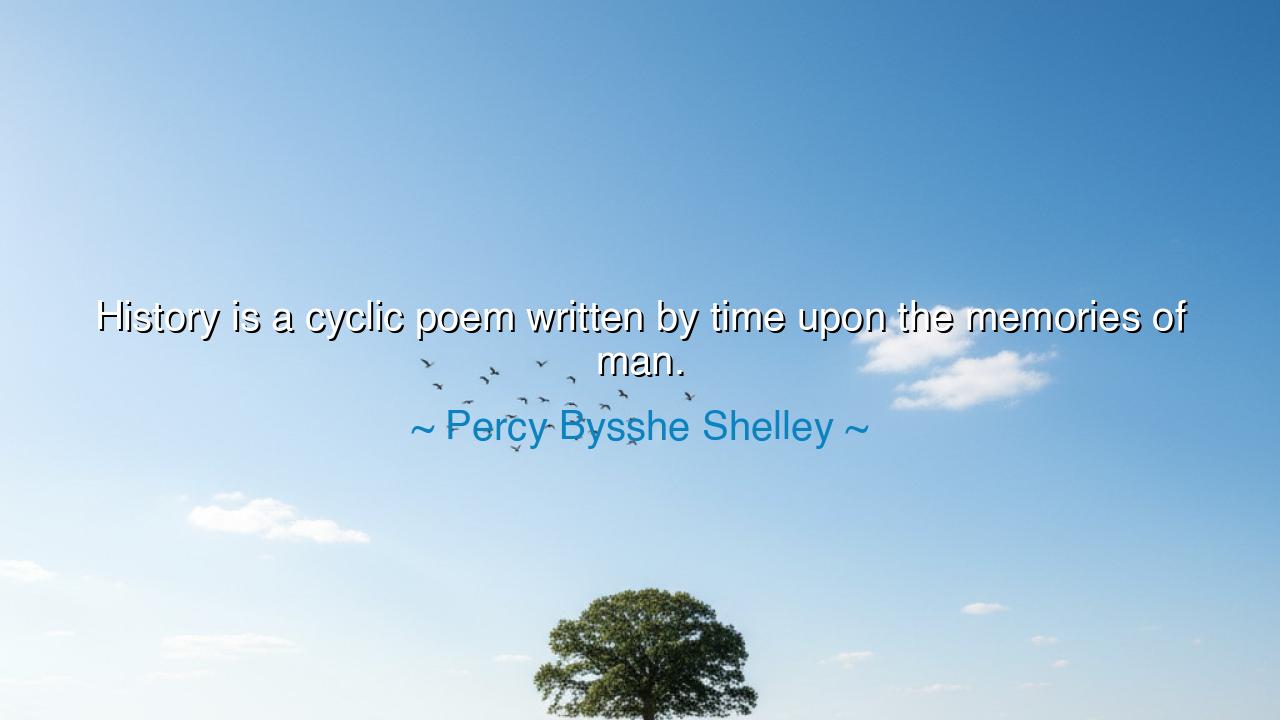
History is a cyclic poem written by time upon the memories of






“History is a cyclic poem written by time upon the memories of man.” Thus spoke Percy Bysshe Shelley, the poet of fire and spirit, whose words move not as mere thought, but as prophecy. In this single line, he weaves together philosophy, poetry, and truth — a vision of history not as a cold record of dates and deeds, but as a living rhythm, repeating and renewing, written by the unseen hand of time upon the fragile tablet of human memory. To Shelley, the past is not dead; it breathes, returns, and rhymes again with the present. Like a poem, it rises and falls in cadence — creation, destruction, rebirth — echoing the eternal song of the human condition.
In calling history a cyclic poem, Shelley reveals the law that all wise men of ages past have known: that existence moves in circles, not straight lines. Empires rise and fall, nations are born and decay, ideas flourish and fade — and yet, through it all, the spirit of humanity endures. The poem of time repeats its verses in new voices, but the themes remain the same: pride and humility, war and peace, light and darkness, hope and despair. What has been will be again, though in another form. Thus, history is not only a mirror of the past, but a prophecy of the future — for the same passions that stirred our ancestors burn still within us.
The ancients saw this truth clearly. The Greeks spoke of the Great Year, the eternal return of all things. The Hindus told of the Yugas, vast cycles of creation and dissolution, through which the universe itself breathes. Even the philosophers of the West — Plato, Polybius, Spengler — felt this pulse, this turning of the cosmic wheel. Shelley, the Romantic poet of revolution, inherited this ancient vision. He had lived in an age of turmoil — the French Revolution’s flame had burned bright, then turned to ash; tyrants had fallen, and new ones had risen in their place. He saw in this repetition the poetry of fate, the rhythm of time itself — majestic, merciless, and deeply human.
Look to the great Roman Empire for proof of Shelley’s vision. Born from the ideals of the Republic, Rome rose through virtue and courage, only to decay under the weight of its own power. Its grandeur became corruption, its freedom turned to tyranny, its order to chaos. And when it fell, the world entered a dark night — but from that night, Europe was reborn. The Renaissance, centuries later, was Rome’s spirit returning in new form, just as a poem’s refrain returns, reshaped by the poet’s breath. Shelley, who revered both art and freedom, saw in this endless renewal a strange beauty — that nothing truly ends; it only transforms.
Yet, his words also carry a warning. For if history is cyclic, then humanity is bound to repeat its follies unless it learns from its verses. Pride brings ruin, ignorance breeds violence, greed corrodes the soul — these are lines written again and again in the poem of time. Shelley calls us not to despair, but to awaken: to remember that each age has the power to change the tone of the poem. Though the pattern returns, it is not fate’s prison, but life’s invitation. We are both reader and author — inheritors of the past, yet also its editors.
Consider Nelson Mandela, who broke one of history’s oldest cycles — that of hatred and revenge. After decades of oppression, when the chance came to repay injustice with vengeance, he chose forgiveness. In doing so, he rewrote a verse that had echoed in blood for centuries. His wisdom proved that while time may write the same rhythms, the heart of man can change the rhyme. Such is the miracle Shelley alludes to — that the poem of history is cyclic, yes, but it is also conscious, capable of growth through understanding.
So, my friend, let this be your lesson: study history not as a burden, but as a poem written by time, and read it with reverence. Listen to its rhythm — the rise of hope, the fall of arrogance, the return of compassion. Know that the same forces dwell within you, and that how you act will shape the next stanza of humanity’s song. Do not be a blind participant in its cycle; be a poet of your age, one who writes with awareness and light.
For in the end, as Shelley teaches, time writes endlessly upon the memories of man, but it is the wise — the lovers of truth, beauty, and freedom — who give meaning to its verses. The cycle may never cease, but we can make its return more luminous, its rhythm more just. Thus, let each life be a line of the eternal poem — clear, courageous, and kind — so that when time writes again, it writes in light, not shadow.






AAdministratorAdministrator
Welcome, honored guests. Please leave a comment, we will respond soon